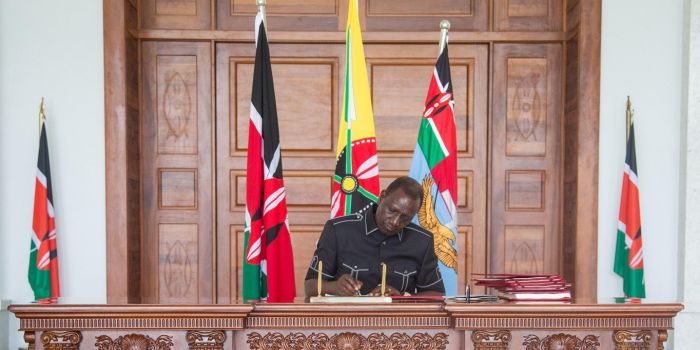Kenyans urged to present their views on rules seeking to eliminate vetting for IDs

The rules seek to align the regulatory framework for ID application and issuance of registration and identification documents to attain the best global practices.
Kenyans have been called upon to give their views on the proposed amendments to the Registration of Persons' Rules (2024) that seek to eliminate vetting for identification (ID) cards.
The rules seek to align the regulatory framework for ID application and issuance of registration and identification documents to attain the best global practices.
More To Read
They further provide for the issuance of electronic third-generation identity cards and digital identity unique personal identifiers, among others.
"Copies of the proposed rules and the Regulatory Impact Statement may be obtained from the state department for Immigration and Citizen Services, Nyayo House, or through the Interior and National Social Security Fund (NSSF) online platforms," the Department of Citizen Services said on Wednesday.
The government abolished vetting for IDs starting this month, consequently dissolving the vetting committees in a new shift in policy as directed by President William Ruto. President Ruto stated that the changes will prevent decades-long exploitation of affected communities by unscrupulous government officials.
 President William Ruto assents to the Statute Law Amendment Bill, 2024, at the State House in Nairobi on April 24, 2024. (Photo: PCS)
President William Ruto assents to the Statute Law Amendment Bill, 2024, at the State House in Nairobi on April 24, 2024. (Photo: PCS)President William Ruto assents to the Statute Law Amendment Bill, 2024 at the State House in Nairobi on April 24, 2024. (Photo: PCS)
The vetting committees were introduced in the mid-90s through an amendment to the Registration of Persons Act.
In 2014, the committees were officially anchored in law under Section 8 (1A) of CAP 107 to ensure that only genuine Kenyan citizens are registered for national identity cards.
Following the policy change, the government last month introduced guidelines that exposed the need to make amendments to some sections of the law to accommodate the changes.
Under the new guidelines, the chief or assistant chief must identify the applicants before registration and certify knowledge of them and the particulars presented by signing and embossing their Left Thumb Print (LPT) on the registration form.
At the same time, the parent/guardian of the applicant shall be required to confirm the same by signing on the application form and inserting their thumbprints on the application form
Where parents are deceased, applicants shall produce a death certificate or death notification and the ID card of a biological parent or guardian (a biological relative) to authenticate the applicant.
As a result, some proposed amendments to the Registration of Persons Act will require the law to permit the recording of a parent/guardian's left thumbprint during the application for an ID.
At the same time, the second schedule requires an amendment to insert the provision for the parent, guardian, or chief's left thumbprint and the chief's ID number.
Top Stories Today












































